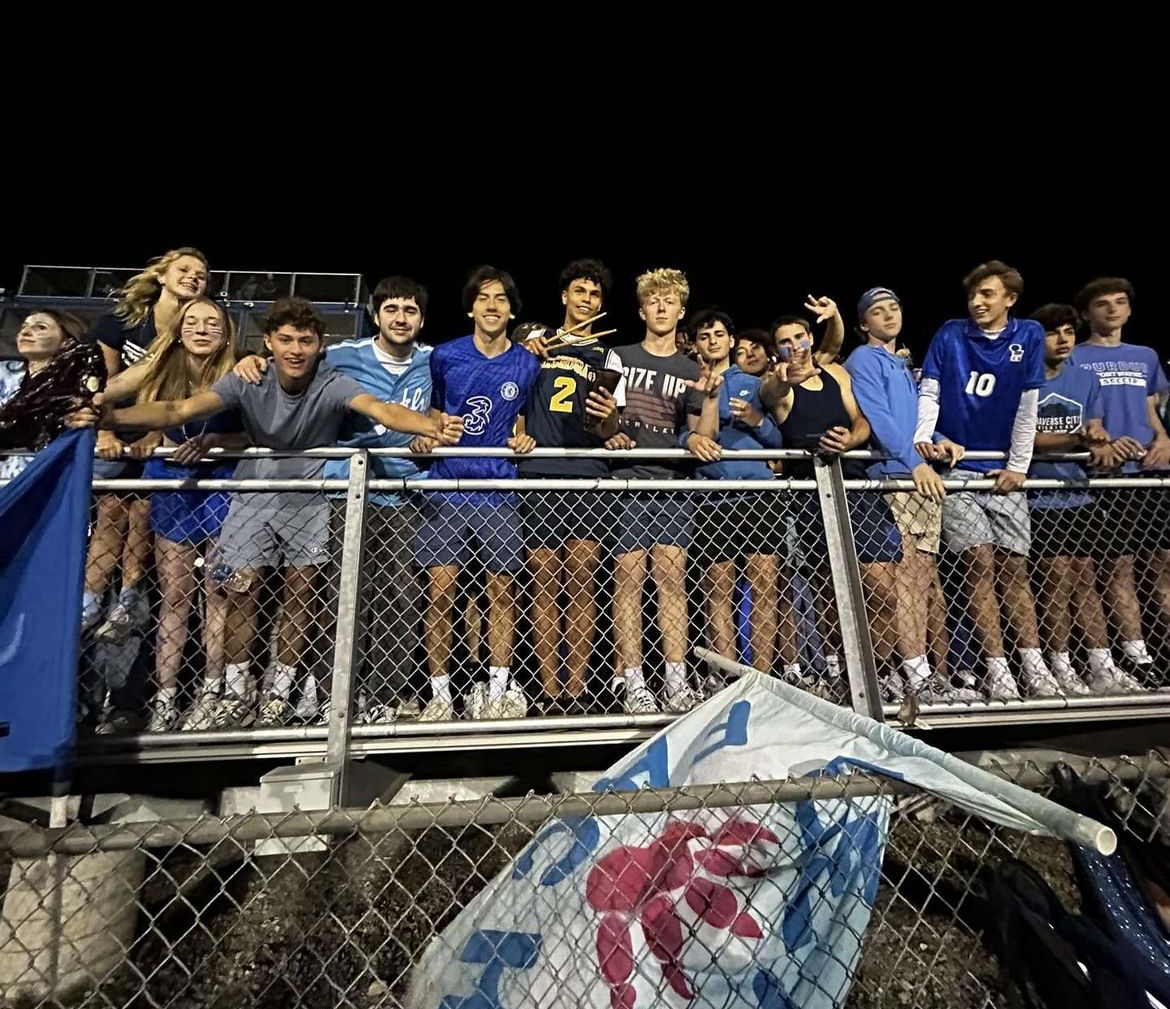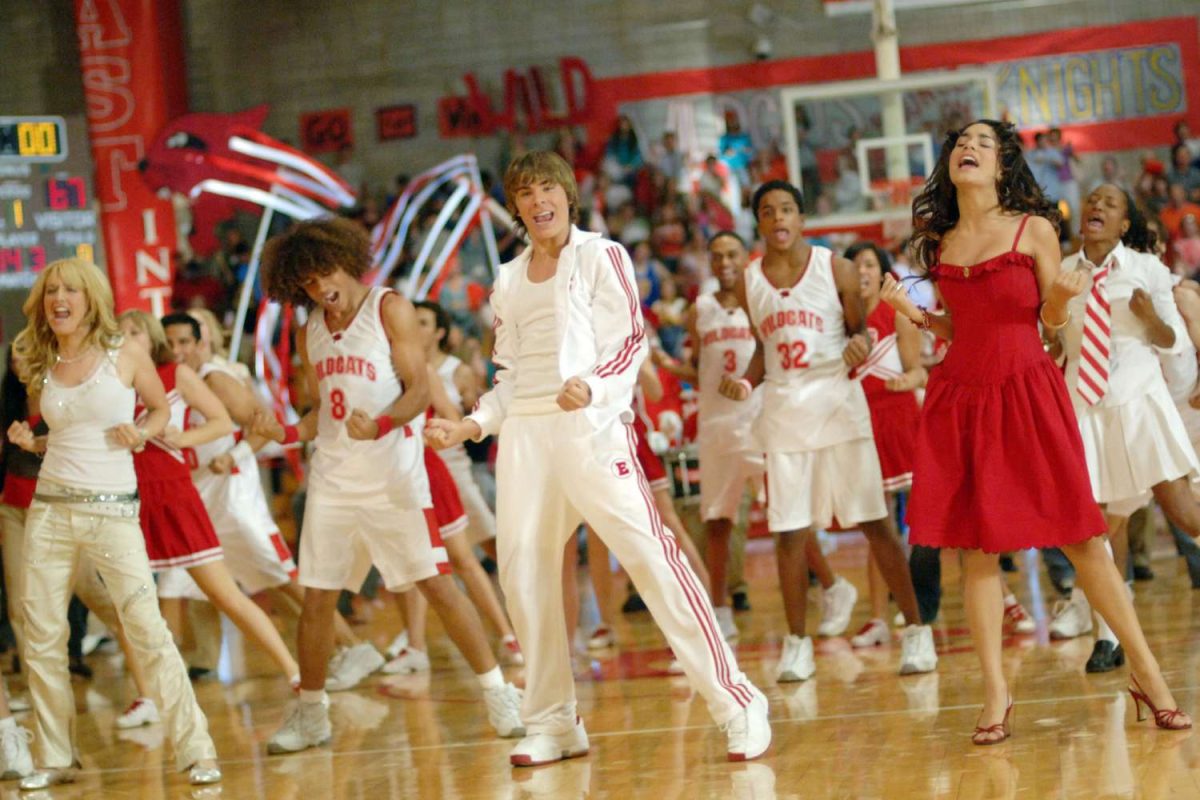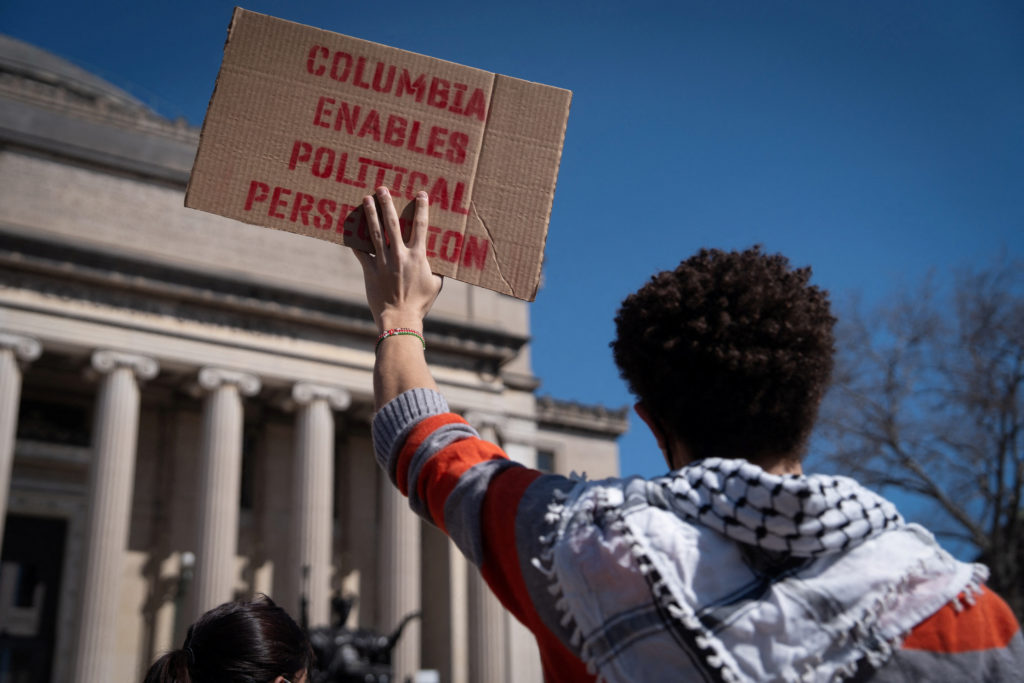Standing in a sea of students, the field lights piercing through the darkened sky, you can hear your pulse in your ears. The anticipation of a touchdown, the thrill of voices, and the excitement of the crowd all around you are palpable. And at the center of it all, is a flag and a cowbell. You’ve seen them before, blasting music, waving their painted flag, and banging their rusted cowbell. I’m referring of course, to the Bear Pack, the group of senior boys spearheading the student section at most events.
Bear Pack is an institution, a BHS tradition viewed by many students as unchangeable. Each year, the metaphorical torch passed down from the graduating class continues to be received by male students only. I believe Bear Pack should expand their group to have female members who can amplify enthusiasm towards female sports, and help promote higher attendance at women’s events. Although stating this won’t automatically change the mechanics of Bear Pack, sharing possible improvements can be a valuable asset to this group, especially when they are inextricably woven into the culture of Berkley athletics.
Despite possible improvements, Bear Pack does have a positive force on the community, and this should not go unnoticed. One of Bear Pack’s roles is setting the tone for the rest of the student body in attendance at events. Whether that’s ramping things up and getting everyone loud and into the game, or reining things in and keeping the crowd from getting too out of hand. They foster support for Berkley Athletics, creating a fun and energetic environment where students feel a part of something.
Another example of the positive influence of Bear Pack is their ability to collaborate with BHS administration to ensure the student section is respectful and safe. A major concern for students when attending events is being kicked out. Mr. Meloche and A.D. Rawlik often remind the student section to maintain school-appropriate behavior, sometimes directing a head shake towards Bear Pack when things start to get out of hand.
Given their commitment to and influence on Berkley athletics, their absence at events can become noticeable. Whether they realize it or not, the members of Bear Pack are leaders, with BHS students adjusting their behavior to match them. So, how might Bear Pack use that power and influence to broaden support so it is present for all Berkley athletes? While I do not wish to discredit this year’s members for their part in showing out to and broadcasting the widespread sporting events at Berkley, the tradition of passing down membership to males is still a concerning trend.
The group prefers to remain anonymous, or as anonymous as they can be while holding a giant flag and their less than inconspicuous social media posts. Bear Pack claims anonymity is a protection and way to prevent students who are not selected from feeling left out. However, there are still plenty who feel glossed over, especially female students who’ve yet to have a chance of selection. One wonders if an underlying reason for their insistence on anonymity may simply be that members are emboldened, hiding behind the guise of a mysterious group. With students having a general idea of the groups’ members, the true anonymity of the Pack is questionable.
Remarking on the positive effect the group has, one of the Bear Pack members detailed, “[we] bring school spirit―encourage it. At games, we’re telling people to get excited, starting chants and stuff like that.” They added that for athletes playing in events, “it’s nice to have support.”
Bear Pack is a tool to amplify the excitement within the student section, but also to support the competing athletes.
The members discussed the group’s continued ‘all boys’ status, stating, “It doesn’t really have to do with gender; it’s more about who we think would lead it best. And obviously it’s, in the past, just been boys but―”
A second member echoed, “And, I feel like we would just choose who could do the best job.”
It’s easy to say change will be made. Enacting that change is another beast entirely. Their responses told me that as people on the inside of this group, the exclusion of women is harder for them to see. While this year’s members might not have intended or had control over their selection, they are still all males, and by not actively working to invite females to join them, they are continuing the cycle of female exclusion that has been rooted within the group since its founding.
In a follow-up session with the members, they explained they take notes throughout the year, looking at who might be a good fit and could bring the most energy to events. The members will likely have a group discussion at the year’s end, during which they will collectively decide who should receive next year’s membership.
In light of inclusiveness, I wanted to get an idea of what other students, outside of Bear Pack, thought about the group. Senior Veah Green shared her thoughts on having more female representation within Bear Pack, expressing her hope that more inclusion could naturally increase the promotion of women’s events.
She recounted, “Last year especially, I tried to get the Bear Pack to include at least one or two girls, but it got vetoed. But if we keep trying, I think we could implement some female perspective into it, so that then we can have more support for the women’s games.”
Some Berkley students, including myself, think some of the disparity in attendance between men’s versus women’s sporting events may stem from the fact that many Bear Pack members are athletes themselves. They know when their own games are, making them unconsciously more inclined to promote their own events. If females were on Bear Pack, more promotion of female sports could be seen.
Another active student within the athletics here at Berkley, Senior Jessie Burns, highlighted the challenge of getting attendance at girls’ games, similarly suggesting that female leaders in Bear Pack could elevate awareness and support for women’s sports.
Burns recalled, “Last year it was hard because [girls soccer] didn’t have a field, so we never really had a crowd, but even the year before that when we had a field, it was pretty light showings. People would be like, ‘Oh like we gotta ask them to post about our sport’ almost… and like, the soccer boys aren’t asking guys in Bear Pack to post about their games.”
Burns continued, “I don’t think it’s ever that people are like girl’s sports don’t matter, but I think sometimes [female athletes] feel brushed under the carpet. So having girls in [Bear Pack] might make it more known when girls’ events are and help have girls as leaders… Because, even if they start posting about the girls, we still want to break the norm of having only guys lead Bear Pack.”
This notion of ‘breaking the norm’ raises the question: why is it so hard to break the unspoken tradition of passing down membership to males? Even now, with it being fairly early in the year, there are plenty of opportunities for Bear Pack to invite female students. So why don’t they? Is the reason for their inaction related to a desire to withhold their power position? An unconscious bias or acceptance of how things have always been? Or simply them failing to consider their female counterparts?
When asked about their reluctance to embrace female leaders in Bear Pack this year, a member cited obligation to past Bear Pack members.
One current member stated, “Membership gets passed down year to year, so we were all selected by someone last year, and so picking [senior girls to add] I think would do an injustice to that tradition. So I think it would have to be going forward.”
While I can understand a sense of responsibility to uphold the traditions of a long-standing group, I don’t believe that outweighs the responsibility they have to current students and the female percentage of the student body. While tradition is important, it should not prevent progress.
The members acknowledged, “I bet some of the girls feel like it’s unfair.” Upon further reflection, one member named a current senior girl he would’ve liked to see in Bear Pack had he been in charge of membership last year. The members have acknowledged the historical exclusion of female students within the group is unfair, but do they fully appreciate the frustration that accompanies this truth?
I appreciated the honesty of another member who stated, “I feel like on more of a general note, I know we’re getting really deep into this, but, it really isn’t that deep… obviously we’re doing the selection and stuff, but that’s mostly just observation and who we think will do the best job.”
I can see where he is coming from―that it should be about who shows up, exudes energy, and embodies school pride best. And, I think that as someone who is male and in Bear Pack and has experienced crowded student sections at his sporting events, it’s probably easier for him to say what they do as Bear Pack is “not that deep.” Even with Bear Pack recognizing the unfairness of the situation, it’s hard to know if they fully understand how it feels being female students outside of Bear Pack, consistently supporting Berkley athletics, being just as invested in making events memorable experiences for students, and receiving little reciprocated support.
Green perfectly described the significance of Bear Pack, saying, “It’s nice to know we have a community of students who like to support the school and each other.” She commented, “Bear Pack is, basically, the community of the school. With the speaker and the involvement, I think it makes it more fun.”
That is the future that we should be working towards. Inclusion and celebration of people and their accomplishments, a sense of community that bonds us. Whether that’s through sports, school spirit, or the hours we spend in classes together, Bear Pack has the potential to be something even greater than the enthusiastic group of senior guys that it is now. It can become all of us, showing up and supporting one another.
These discussions with Bear Pack have been a crucial first step in understanding each other’s perspectives. Communication is a valuable tool for change. The shared interest of wanting student athletes to experience more attendance and excitement at events was revealed by engaging in curiosity driven conversations. I am under no delusion that this one conversation will create the Bear Pack that I and so many others are fighting for, but it’s a start. At a certain point, we as the student body must realize the future of Berkley Athletics is in our hands.
Enacting change requires initiative. If the goal for girls at Berkley is to have a platform adjacent to Bear Pack, the way forward may be in the founding of a new group. Those tired of waiting, take action. If you want students to support your events, that starts with you supporting someone else. When your friend mentions the volleyball game later? Go. It’ll be fun. Whether Bear Pack becomes more inclusive or a new group emerges, the student body can shape a legacy of spirited support and community. We want big crowd turnouts, energetic chants, and the memories that come with being Berkley Bears supporting our teams, so what are we going to do to make that happen?
Getting more involved in Berkley Athletics looks different for everyone. Maybe for you it’s something as small as wishing an athlete good luck on their upcoming event, or maybe you’re breaking out the face paint and gearing up for an event that will entail a lot of supportive shouting that will inevitably result in the loss of your voice the next day. Whatever your action may be, it starts with being informed about upcoming events. To do that, visit the complete Berkley Athletics Calendar at https://berkleyathletics.com/main/calendar or using the QR code below, as well as subscribe to Athletic Director Rawliks’ Instagram @berkley_bears if you haven’t already. GO BEARS!









